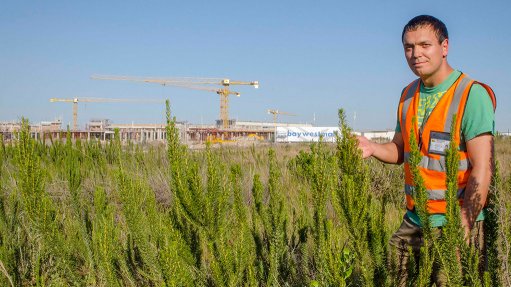
Almost one year since the opening of the Eastern Cape’s largest mall, an environmental report has pointed to the positive impact the responsible development has had on the sensitive fauna and flora in the area, thanks to careful interventions to preserve indigenous species.
A recent environmental audit of the Baywest site by Moorhouse Consulting – the independent consultants appointed to monitor rollout of the mammoth multi-billion rand project – states that the environment is better off today than it would have been, if the property was not developed.
Before development began, the site – which falls within the urban edge of the city – was prone to regular bush fires and had been overrun with herds of grazing cattle and illegal quad-bikers, while alien plant species such Port Jackson and Blue Gum had been left to grow unabated. This had seen threatened indigenous plant species such as the Cyclopia pubescenes almost eradicated.
To ensure that sensitive flora and fauna were preserved during the construction of the R2-billion Baywest Mall, and later the rollout of the Baywest City precinct, co-developers Abacus Asset Management and Billion Group cordoned off 55ha of the 310ha site as protected areas, which will never be developed.
According to the report’s authors Sherry Moorhouse and Marcelle Basson, money and resources committed by the Baywest developers have seen the Cyclopia pubescenes thrive, while a team – also paid for by the developers – has been consistently working to eradicate invasive alien plants, in the conserved areas.
“In the past some developers threw caution to the wind and built without any concern for preserving the environment. This project makes a strong case for how responsible development and environmental preservation can go hand-in-hand,” said Moorhouse.
“There are 13 conserved areas on the site. Before the developers moved onto site, these areas were being destroyed by illegal squatters, bikers, roaming herds of cattle and erosion that was partially a result of an invasion of alien plant species. “Now we have wetlands on site which are thriving, an alien species eradication programme which is going well, and all landscaping on site must include indigenous plants.” The community had also been in involved in the alien eradication programme, which they cut down and sell as firewood, said Moorhouse.
In addition, special environmental awareness training given to all construction workers on site had seen local fauna rescued and relocated to the site’s conserved areas, rather than killed by workers.
“The norm is for workers to kill snakes, out of fear. Following the environmental training, they would instead call our environmental control officer on site to remove it from the construction area, after which it was placed in one of the conserved areas,” she said.
“A large number of fauna were rescued and relocated, including more than 180 snakes, 275 tortoises, 110 lizards and chameleons, 30 invertebrates such as scorpions, eight arachnids [baboon spiders].” Prior to construction, independent conservation officer Mark Marshall and a team undertook the mammoth task of relocating an entire natural rocky outcrop and replanting 3 500 individual plants at the site of the relocation within a cordoned-off protected area.
This was in addition to handpicking and preserving more than 4 500 plants, noted as “species of special concern”, from the footprint of the Baywest Mall, preserved in an off-site nursery and returned last year to the various conserved areas.
Baywest City MD Gavin Blows said the developers believed there was an important balance to be found between building and conserving the environment. “Environmental conservation is important and, as developers of malls throughout South Africa, we believe it’s important to ensure that the sensitive natural environment is preserved,” said Blows. “We believe it’s possible to balance the environment and development, and that’s what we are striving for at Baywest.”